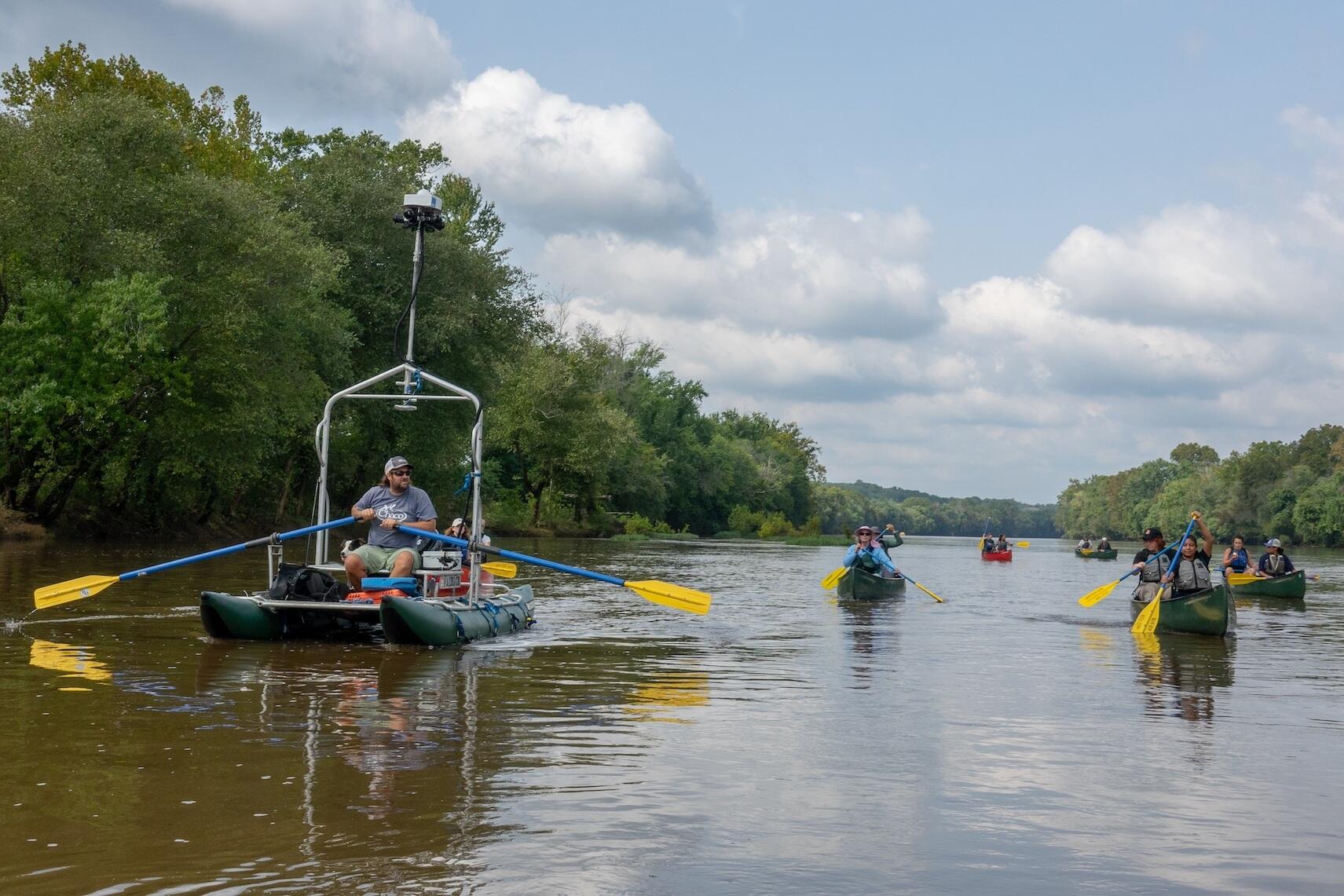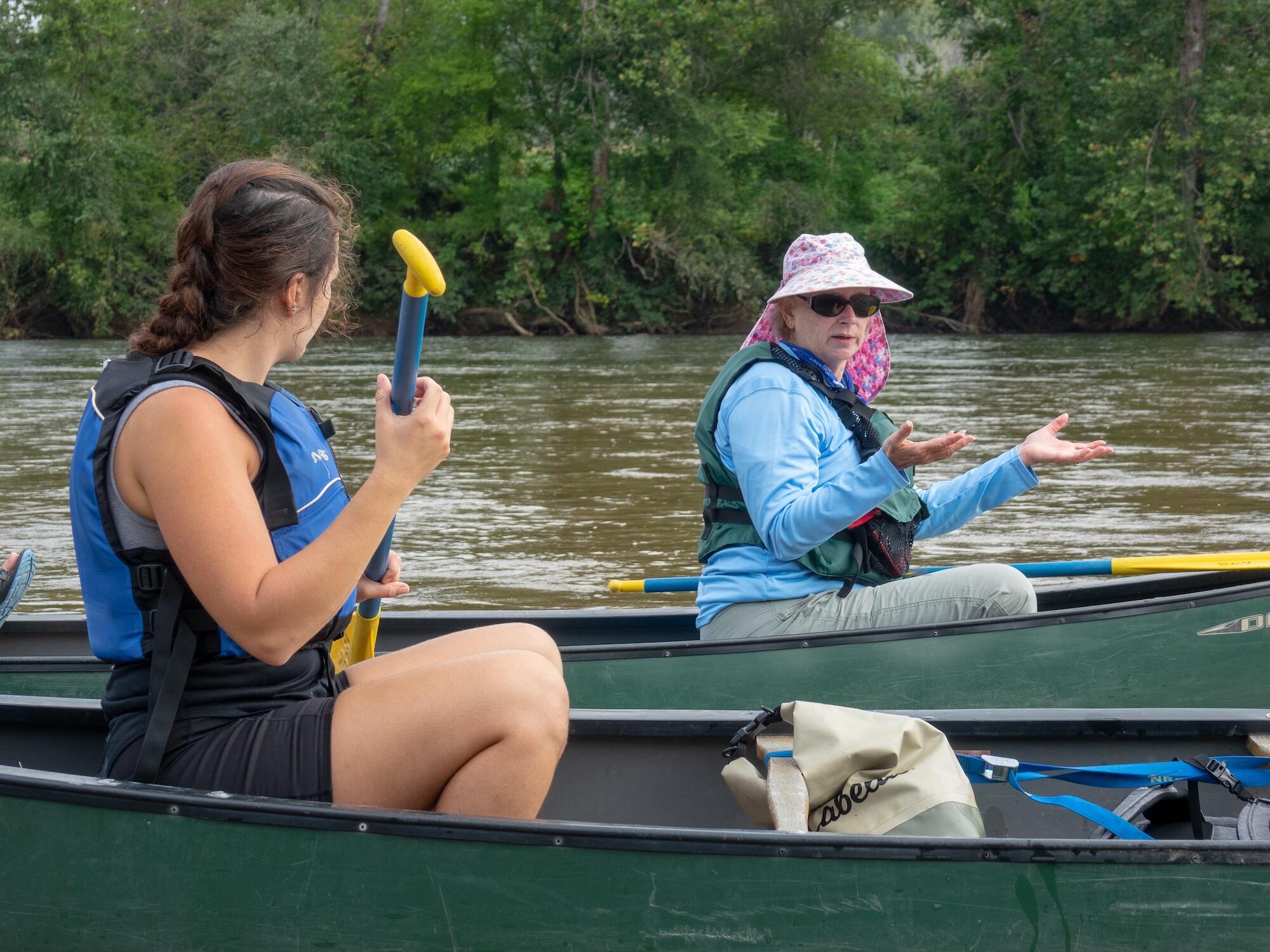
Jan. 3, 2022
VCU students to assess rivers on behalf of Virginia’s Scenic Rivers Program
Share this story
In 2020, students in the Virginia Commonwealth University course Scenic Resource and Policy Assessment conducted a field assessment of a roughly 11-mile section of the middle James River between New Canton to Columbia running through the Virginia counties of Buckingham, Fluvanna, Cumberland and Goochland.
The class studied that stretch of the river’s landscape, historic features, vegetation, water quality, fish and wildlife — including identification of endangered or threatened fish and bird species — public recreational access and a variety of other measures.
Their goal was to make a formal recommendation to the Virginia Department of Conservation and Recreation about whether that section of the James should be added to the Virginia Scenic Rivers Program, which aims to identify, designate and help protect rivers and streams in Virginia that possess outstanding scenic, recreational, historic and natural characteristics of statewide significance for future generations.
“The section began at New Canton Landing and ended approximately 11 miles downstream at Columbia Landing and the Route 690 bridge,” the class’ report concludes. “Based on physical features of stream corridor, historic sites, natural resources and recreational opportunities, this section should be considered for designation under the Virginia Scenic Rivers system.”
While that designation won’t be enacted until approved by the General Assembly — a vote that may occur during the 2022 session — the project was so successful that the Department of Conservation and Recreation and VCU’s Center for Environmental Studies have entered into a formal agreement in which VCU students will conduct similar evaluations for the Scenic Rivers Program each year, beginning in the spring semester.
“DCR thinks this collaboration is so good we have developed a [memorandum of understanding] to work with the Center for Environmental Studies each year on a river evaluation or reevaluation,” said Lynn Crump, an environmental programs planner and coordinator of the Virginia Scenic Rivers Program at DCR.

James Vonesh, Ph.D., a professor in the Center for Environmental Studies who taught the course, will co-lead the project with Jennifer Ciminelli, an assistant professor in the Center for Environmental Studies and leader of the center’s new GeoCORE lab that provides partners, researchers, students and the VCU community with resources to train and support spatial data development, analysis and interpretation.
“This grant supports training of VCU students with real-world hands-on training in the policies, study, assessment and reporting of scenic natural resources and in doing so supports the DCR's mission to recognize and support Virginia's scenic resources,” Vonesh said.
The students who will participate include those taking a course in scenic natural resources, as well as others doing independent studies or as graduate assistants. They will conduct assessments of Virginia rivers similar to the 2020 report.
“As they learn about scenic resources more generally, they will develop hands-on skills in desktop and field assessment tools and protocols and produce and present a technical report as they conduct a study of a river segment that is being considered for scenic designation,” Vonesh said.
The skills they learn — including cartography, field data collection, field planning and safety skills, creation of “story maps,” basic quantitative analysis, technical report writing and presentation — will be invaluable for careers in biology, environmental science and many other fields, Vonesh said.
As an example of the hands-on skills students will acquire, Vonesh pointed to the 2020 students’ work with Richmond-based company Terrain360 to develop panoramic views of the section of the river they were studying.
The new collaboration with the Department of Conservation and Recreation builds on recent research by VCU graduate students and led by Dan McGarvey, Ph.D., an associate professor in the Center for Environmental Studies.
Their two-year study, published recently in the journal Biological Conservation, investigated whether Virginia rivers designated as part of the Scenic Rivers Program provide fish with higher quality habitat than statewide rivers at large. They found that for 21 of 33 species they studied, model-predicted habitat suitability was significantly higher in scenic rivers than in those without the designation.
The collaboration also builds on other initiatives at VCU focused on rivers and experiential education.
This fall, the Center for Environmental Studies and the Outdoor Adventure Program at VCU began offering a Certificate in Outdoor Leadership, providing hands-on experience and training for students interested in pursuing leadership roles in private and government land management, the outdoor recreation industry, field research, environmental education, ecotourism and other fields.
Additionally, VCU has partnered with the River Management Society to offer a River Studies and Leadership Certificate, awarded upon completion of river-focused coursework and a river-related professional project.
Over the summer, the National Science Foundation awarded a $497,000 grant to Vonesh to lead a collaborative network of more than 100 professors across 35 states focused on providing undergraduate STEM education through inclusive, interdisciplinary and immersive field studies on the nation’s rivers.
That grant followed a $2 million grant awarded by the foundation to a team of researchers, including McGarvey, to fund Emerge, a project that aims to support training and experiences for underrepresented minority students and early career scientists in freshwater science.
And last April, VCU hosted the River Management Society’s 2021 River Management Symposium, a national virtual gathering that brought together representatives from the public, academic and private sectors to network and share insight into the successful stewardship of rivers, creeks and streams in North America and around the world.
The event also marked the 50th anniversary of the Virginia Department of Conservation and Recreation’s Virginia Scenic Rivers Program and its role in shaping protective efforts of the state’s most notable and significant waterways.
Subscribe to VCU News
Subscribe to VCU News at newsletter.vcu.edu and receive a selection of stories, videos, photos, news clips and event listings in your inbox.







